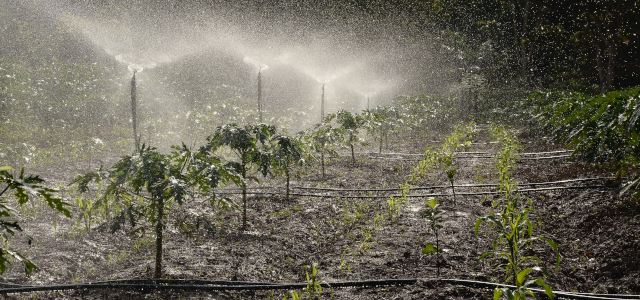The first Water-Energy-Food (WEF) Nexus Winter School or short course designed specifically for Southern Africa will take place from 26 - 30 July 2021 in Pretoria, South Africa. This hybrid in-person/virtual event is organised by the University of KwaZulu-Natal’s Centre for Transformative Agricultural and Food Systems, in partnership with Global Water Partnership Southern Africa, UNESCO-IHE Delft, the Water Research Commission, and WaterNet.
The Water-Energy-Food Security Nexus, according to the Food And Agriculture Organisation of the United Nations (FAO), refers to the fact that water, energy, and food security are interlinked and actions in any one particular area often can have effects in one or both of the other areas.
The WEF Nexus Winter School has been developed as a capacity-building initiative aimed at providing support to early career researchers, postgraduate students, managers, and practitioners in understanding WEF Nexus thinking as a transformative approach to sustainable natural resources management and socio-economic development.
The overall objective of the WEF Nexus Winter School is to improve evidence-based decision-making capacities towards:
- achieving simultaneous WEF securities;
- sustainable natural resources management;
- socio-economic developments;
- understanding WEF trade-offs and synergies;
- innovating through the WEF Nexus for job and wealth creation; and
- linking science to informing policy and decision-making in their respective countries.
“As the Nexus field of research is relatively new, participants will be exposed to a rapidly developing and critically important way of thinking,” said Professor Tafadzwa Mabhaudhi, Co-Director of the Centre for Transformative Agricultural and Food Systems.
“Participants will improve their knowledge of the WEF Nexus and become acquainted with the concepts, how to facilitate discourse, and new frameworks, tools, and methods for analysing the WEF Nexus,” he added.
In essence, the winter school will focus on:
- Improving the ability to conceptualise the WEF Nexus linkages and potential impact on resource management and regional policies;
- Strengthening skills and knowledge about tools and methods for WEF Nexus assessments, planning, monitoring, and evaluation; and
- Networking and mentoring, i.e., improving international communications between practitioners, postgraduates, early career researchers, senior researchers, and experts to build and consolidate a WEF Nexus network in southern Africa.
Professor Mabhaudhi said the WEF Nexus Winter School for Southern Africa is set to become an annual event.
“The plan is for the core content to stay the same but there will be some variable content that will change annually to reflect the current state-of-the-art WEF Nexus research and development,” he said.
The WEF Nexus concept was popularised in Southern African actors after 2011. Since then, there has been progress in building a shared understanding of the WEF Nexus concept, using it to facilitate discourse through various dialogues, and developing frameworks and analytical models and tools.
The Southern Africa Development Community (SADC), with technical assistance from GWPSA, developed the SADC Water-Energy-Food (WEF) Nexus Governance Framework, which was later approved in a joint meeting held by the Ministers responsible for Energy and Water from SADC on the 30 October 2020.
Professor Mabhaudhi said: “As the WEF Nexus has grown in prominence and relevance over the last decade, a key capacity gap has also emerged. This gap has mainly been caused by trainings and capacity building exercises that continue to be sector-based. The WEF Nexus Winter School is a direct response to the need for developing capacity on all three of the WEF Nexus’ tenets – concepts, discourse, and analytics.”
“It aims to achieve the training of a new cadre of young scientists, practitioners, and emerging leaders who are trained in transdisciplinary approaches that can enhance the transition from WEF Nexus theory/thinking to WEF Nexus practice/doing in southern Africa, in particular, and the African region overall.”
Who should apply?
Early career researchers, postgraduates, managers, practitioners (NGOs, Government, River Basin Organisations), and stakeholders conducting research and development related to the WEF Nexus and related fields, such as agriculture, forestry, water, energy, engineering, climate change, ecosystems, and environment. Applicants must demonstrate an advanced (C1) English level (please, see the application form).
Where
The WEF Nexus Winter School will be held at Future Africa, University of Pretoria, Hillcrest Campus, Pretoria, South Africa from 26 to 30 July 2021. The venue has accommodation facilities. The winter school organisers will closely monitor the COVID-19 pandemic situation and timeously communicate any changes via email.
Program Cost:
The program fee is USD 1,000 per participant. The fee includes registration, lunch, and teas during the Winter School and a field trip. Participants are responsible for their own accommodation, flights, airport transfers, and meals outside the Winter School hours. A limited number of full and partial sponsorships are available to participants from SADC countries who meet the criteria (see application form for details).
To find out more about the First WEF Nexus Winter School for Southern Africa, click here.
To Apply
Click here to download the application form and learn more about the 1st WEF Nexus Winter School for Southern Africa. Submit your applications to waternet@waternetonline.org with subject WEF Winter School. You may also use that email for enquiries.
DEADLINE FOR APPLICATIONS IS 31 MARCH 2021
Photo Credit: Phillip Junior Mail via Unsplash
